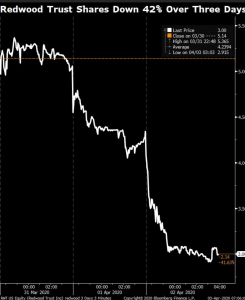Direxion has announced that on March 31, 2020, the leverage of 10 daily ETF’s will be changed from 300% to 200%. Direxion released the following presser:
NEW YORK — March 27, 2020—The investment objective and strategy of each Fund in the table below is currently to seek daily leveraged, or daily inverse leveraged, investment results, before fees and expenses, of 300% or -300%, as applicable, of the performance of its underlying index. Effective after market close on March 31, 2020 each Fund’s investment objective and strategy will change to seek daily leveraged, or daily inverse leveraged, investment results, before fees and expenses, of 200% or -200%, as applicable, of the performance of its underlying index, as shown below:
| Ticker |
Fund |
Underlying Index |
New Daily Leveraged Investment Objective (before fees and expenses) |
| BRZU |
Direxion Daily MSCI Brazil Bull 3X Shares |
MSCI Brazil 25/50 Index |
200% |
| RUSL |
Direxion Daily Russia Bull 3X Shares |
MVIS Russia Index |
200% |
| NUGT |
Direxion Daily Gold Miners Index Bull 3X Shares |
NYSE Arca Gold Miners Index |
200% |
| DUST |
Direxion Daily Gold Miners Index Bear 3X Shares |
-200% |
| JNUG |
Direxion Daily Junior Gold Miners Index Bull 3X Shares |
MVIS Global Junior Gold Miners Index |
200% |
| JDST |
Direxion Daily Junior Gold Miners Index Bear 3X Shares |
-200% |
| ERX |
Direxion Daily Energy Bull 3X Shares |
Energy Select Sector Index |
200% |
| ERY |
Direxion Daily Energy Bear 3X Shares |
-200% |
| GUSH |
Direxion Daily S&P Oil & Gas Exp. & Prod. Bull 3X Shares |
S&P Oil & Gas Exploration & Production Select Industry Index |
200% |
| DRIP |
Direxion Daily S&P Oil & Gas Exp. & Prod. Bear 3X Shares |
-200% |
Since inception, these 10 Direxion funds have been used by traders, funds and investors as trading or hedging vehicles. Collectively, these funds hold billions of dollars of total assets. Direxion’s changing the leverage ratio of its funds may have been prompted by the extreme market volatility seen across capital markets throughout March 2020. However, this change could lead to immediate and significant losses by both Direxion fund investors and those who purchased options on Direxion funds.
Lax & Neville has significant experience with complex securities cases involving ETFs, ETNs and options. If you have suffered investment losses from Direxion funds or options, or your broker’s or investment advisor’s purchase of ETFs or ETNs in your investment account, contact Lax & Neville LLP today at (212) 696-1999 and schedule a consultation.

 New York Securities Lawyer Blog
New York Securities Lawyer Blog

